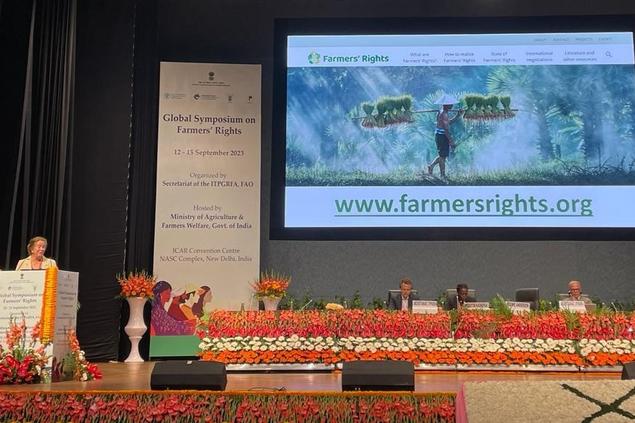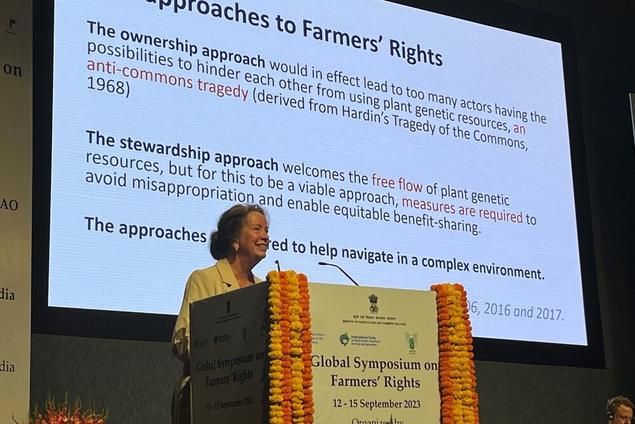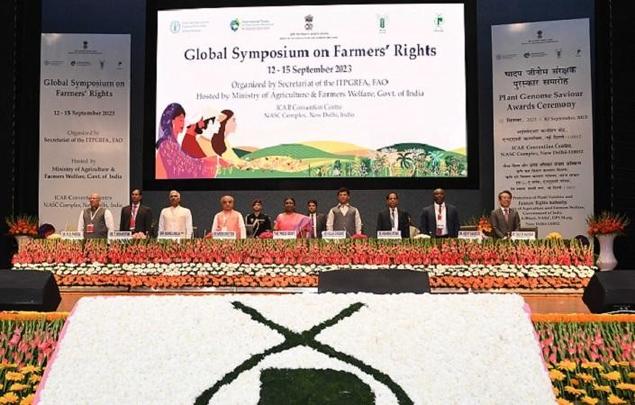FNI contributes to Global Symposium on Farmers’ Rights

At the Global Symposium on Farmers’ Rights held in New Delhi, 12–15 September 2023, FNI’s Regine Andersen contributed with an introduction on historical perspectives on the international negotiations on farmers’ rights under the FAO. The symposium was inaugurated by the President of India.
In her introduction on historical perspectives, Regine Andersen highlighted the roots of farmers’ rights in FAO, and how other international regimes affected these negotiations. Applying her Stewardship and Ownership Approach for analyzing these developments, she explained how the provisions on Farmers’ Rights in the 2001 International Treaty on Plant Genetic Resources for Food and Agriculture (the Plant Treaty) can be understood in light of this approach. Although legally non-binding, these provisions offer a platform for negotiations on how to implement farmers’ rights with the potential of shaping international norms. Andersen explained how the Governing Body of the Plant Treaty functions in this regard, and how negotiations and intersessional work have led to a joint understanding of central aspects of farmers’ rights and their implementation. Moreover, she noted, instances of implementation of farmers’ rights are increasing, as shown by an inventory compiled by the Secretariat of the Plant Treaty.

In connection with her presentation, Regine Andersen launched a new website on farmers’ rights, developed to support the realization of farmers’ rights related to seed and crop genetic resources with research-based guidance. The website is hosted by the FNI and developed as part of the DIVERSIFARM project with support from the Research Council of Norway. It builds on a previous website that was widely used as a gateway to information on Farmers’ Rights and is offered a new global gateway.
The Global Symposium in New Delhi was organized by the Government of India together with the Secretariat of the Plant Treaty. It gathered more than 200 participants from around the globe to discuss the further steps required for the realization of farmers’ rights. Regine Andersen contributed a background document, a synthesis of the research on farmer-managed seed systems and farmers rights; she also served as rapporteur compiling the suggestions on ways forward.
The contribution of FNI builds on many years of research on the implementation of the Plant Treaty as well as its relations with other international regimes. It is also based on the results of the 2005–2012 Farmers’ Rights Project undertaken by FNI to support the implementation of Farmers’ Rights, as set out in the Plant Treaty, with research-based guidance. In turn, the project has given rise to many events and publications, including the 2013 book Realising Farmers’ Rights to Crop Genetic Resources – Success Stories and Best Practices (edited by Regine Andersen and Tone Winge), later reprinted and issued as a paperback, and Stewardship or Ownership: How to realise Farmers’ Rights? (written by Regine Andersen), as a chapter in the Routledge Handbook on Agricultural Biodiversity.

In 2007, FNI co-organized the first international informal consultation on farmers rights in Zambia, together with the governments of Zambia and Norway. FNI also co-organized the Global Consultation on Farmers’ Rights in Ethiopia in 2010 together with the government of Ethiopia. Furthermore, Regine Andersen co-chaired the Global Consultation on Farmers’ Rights in Indonesia in 2016, organized by the governments of Indonesia and Norway and the Secretariat of the Plant Treaty. She was lead author in developing the co-chairs’ summary of recommendations from the consultation. Andersen also presented highlights from the consultation at a side event at the Seventh Session of the Plant Treaty’s Governing Body in Kigali, with more than 80 participants. At this session, she also organized a side event on community seed banks, which resulted in a report.
Regine Andersen has participated as an expert in the Norwegian delegations to all sessions of the Governing Body of the Plant Treaty. At its 7th Session, she was elected co-chair of the Contact Group mandated to negotiate the decisions on Farmers’ Rights, together with colleague Godfrey Mwila from Zambia. Throughout the week, Andersen facilitated negotiations as well as contact between the parties between the meetings of the Contact Group in order to help the parties to reach consensus. And indeed, the group agreed on establishing an expert group to develop an inventory of experiences and derive options for the implementation of farmers’ rights and presented this to the Governing Body which made the formal decision. This was seen as a breakthrough in the negotiations on farmers’ rights under the Plant Treaty. Later Andersen participated in the Ad Hoc Technical Expert Group that was set up to carry out these tasks, and contributed the basic framework for developing the inventory as well as the options in the form of a set of categories.
